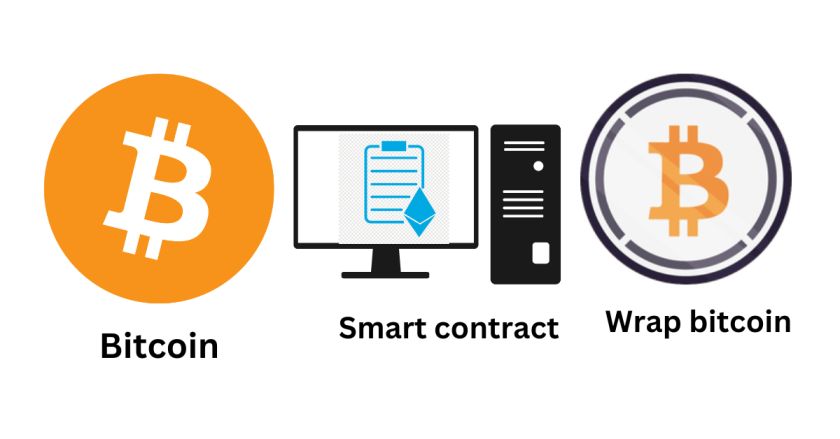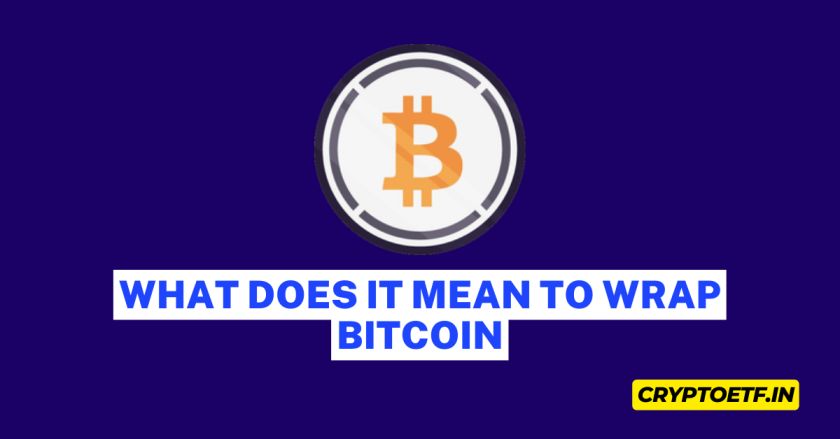Wrapped Bitcoin involves locking your Bitcoin into a multi-signature account with an attached smart contract that generates a token called wrapped Bitcoin. This token represents the amount of Bitcoin you have locked and can be used on an external chain to access services built on that chain.
Blockchains, including Bitcoin and Ethereum, use their own distinct protocols and functions that rely on different algorithms. As a result, they are unable to directly communicate with one another. Although this approach helps maintain the independence, sovereignty, and security of each blockchain, it also poses a hurdle in creating an interoperable ecosystem where data and information can be effortlessly exchanged among different blockchains.
Top of Form
By using WBTC, you essentially transfer your Bitcoin to a third party with finality and receive a token that can be used on other chains. This enables you to participate in decentralized finance (DeFi) applications, as WBTC is integrated into the world of wallets, dApps, and smart contracts.
The main benefit of WBTC is that it allows Bitcoin holders to take advantage of the services provided by DeFi applications.
How do Wrapped Bitcoin Tokens function?

Wrapped Bitcoin can be a suitable solution if you want to keep your value in Bitcoin but also want to use decentralized apps or exchanges on other blockchains. This way, you can explore different chains without having to trade your Bitcoin for other tokens.
However, there are some risks associated with wrapped Bitcoin. One of them is the smart contract used in the process, while another is the third party responsible for the minting process. Additionally, external chains are usually less secure than the Bitcoin blockchain, which poses another risk.
Since many DeFi ecosystems and dApps operate on smart contract networks instead of the Bitcoin blockchain, wrapped Bitcoin can serve as a bridge, allowing users to experiment with these platforms and potentially earn additional yield on their Bitcoin.
Furthermore, wrapped Bitcoin is an attractive option for those who want to purchase Bitcoin from exchanges that don’t require KYC. Users can trade with stable coins and secure wBTC, unwrap the wBTC, and transfer it to a standard Bitcoin wallet.
What advantages do Wrapped Tokens offer?
If you want to hold onto your Bitcoin and use decentralized apps or exchanges on different blockchains, Wrapped Bitcoin (WBTC) is an option to consider. However, using WBTC comes with certain risks. One such risk is the smart contract you use, while another is the third party responsible for minting. In addition, external chains are less secure than the Bitcoin blockchain, which poses an additional risk.
Many DeFi ecosystems and dApps operate on smart contract networks, rather than the Bitcoin blockchain. WBTC can bridge this gap and allow users to experiment with these platforms, potentially earning additional yield on their Bitcoin.
WBTC is also an attractive option for those who want to buy Bitcoin from exchanges that do not require KYC. By trading with stable coins and securing WBTC, they can unwrap it and transfer it to a standard Bitcoin wallet.
Is wrapped BTC safe?
From a technical standpoint, a wrapped Bitcoin token is generally considered safe as it is held in secure platforms such as Ethereum or Binance Smart Chain. Once converted into an ERC-20 or BEP-20 token, it inherits the security of the corresponding network.
However, one of the main issues with wrapped BTC tokens is the need to trust the custodian that holds the underlying asset. If the custodian were to release the actual Bitcoin to someone else, the token holders of the ERC-20 compatible wrapped BTC would be left with a worthless asset.
The level of security provided depends on how the Bitcoin is held. A centralized custodial bridge is an organization that promises to mint ERC-20 tokens on Ethereum, for example, and holds the Bitcoin. Users must trust that these organizations will hold the BTC and not abscond with it. It is essential to ensure that such organizations are backed up by guarantees and insurance policies in case of any mishap.
In a decentralized world of crypto, a smart-contract-managed bridge would be the optimal choice. There is no need to trust any third party, only the code of immutable time-stamped smart contracts.
The security of wrapped BTC bridges, also known as cross-chain connections, has been a hot topic of discussion in the DeFi community for a long time since custodians must be relied upon to keep the actual BTC locked up.
conclusion
Wrapped cryptocurrencies allow cryptocurrencies to be used on blockchains that they were not originally designed for. This enables popular cryptocurrencies like Bitcoin to be used on smart contract platforms such as Ethereum. This interoperability feature has increased the usefulness and liquidity of smart contract platforms and decentralized finance (DeFi) applications. Other reasons to wrap cryptocurrencies may include the ability to swap ERC-20 tokens or take advantage of certain blockchain functions that are not available on the cryptocurrency’s native blockchain.
- What is a stablecoin?
- What Is a Short Squeeze
- FASB Agrees on Fair-Value Accounting for Crypto Asset Disclosure.
- Decentralized Finance: Everything You Need to Know About the New Financial Technology

Naren is a finance graduate who is passionate about cryptocurrency and blockchain technology. He demonstrates his expertise in these subjects by writing for cryptoetf.in. Thanks to his finance background, he is able to write effectively about cryptocurrency.
